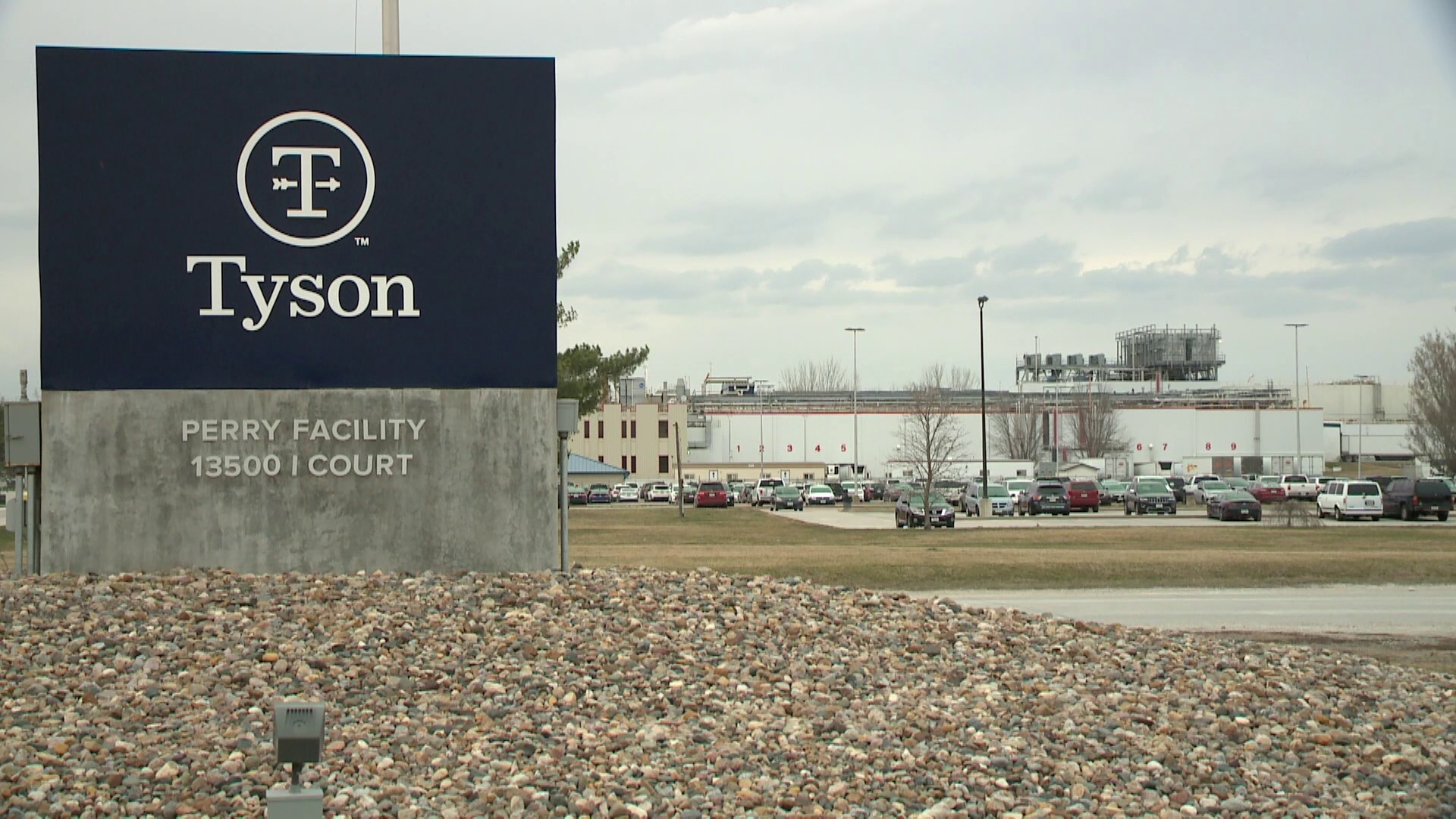PERRY, Iowa — The Tyson Foods plant in Perry is set to close in June, the company announced earlier this month. With more than 50% of plant's workforce either living in Perry or other parts of Dallas County, the shutdown will impact the community's future.
After all, Perry is small city of 8,000 people — and hundreds of people in or near Perry losing their jobs could have a big ripple effect spreading far beyond employment.
Perry Mayor Dirk Cavanaugh said the upcoming closure also has the potential to impact jobs beyond the Tyson plant.
“If spouses of people that work at Tyson leave and take their spouse with them, that’s another job somewhere," he said.
Perry City Administrator Sven Peterson added workers at other businesses that rely on Tyson are also at risk.
Local businesses that benefit from the traffic the plant brings to town could also be impacted.
Using a special software, the Greater Dallas County Development Alliance calculated the potential impact of the closure, with a majority of it being felt in Dallas, Boone, Greene and Guthrie counties.
According to the GDCDA, the potential fallout could lose nearly 550 jobs in related industries, along with more than 200 other jobs due to less customer spending.
The Tyson closure could also impact the Perry Community School District.
“There’s about 292 kids in the school district with a direct tie to a Tyson employee," Peterson said.
The school district’s budget is based on property tax values and the money the state pays per student. So, if the students leave, so will the money the state pays per pupil.
“With the way that works out with this budget year's supplemental aid, that would come out to about a $2.2 million dollar hit if all 292 of those kids left the district," Peterson said.
The future of property values, both residential and commercial, is also up in the air. Kelsey Straub with the Dallas County Assessor’s Office told Local 5 that, if many people leave or spend less at local businesses, values could go down.
However, commercial property values will only drop if it gets to the point that businesses start having to shut down. Other factors like levy rates can also impact property taxes.
If property values do drop, the impact on property taxes would be felt about two years after the fact because of how Iowa assessments work, according to Straub.
She added that there would have to be a major change in the market for property values to go down at all.
“So property assessments is one of the key factors in how your property taxes get calculated," she said.
Property taxes help fund the school district, as well as the city, the county and the hospital.
“All of Perry people that get medical attention here in town get it through Dallas County Hospital," Cavanaugh said.
The mayor, who also serves on the hospital board, fears less patients means less revenue to operate local medical facilities.
Plus, Tyson is a good corporate citizen, meaning they donate to local projects and events.
"Our soccer complex, probably in 2015 or 2016, they donated $100,000 to that project," Peterson said. "That was probably about a $1 million project total."
While their large donations aren't a regular thing the city relies on, Peterson said their small donations still make a difference.
In fact, Tyson has annually sponsored multiple city events, according to Cavanaugh. Other donations include an annual $500 to $600 donated to the rotary through an auction.
"And our total annual budget is about $10,000, so it's just a little under 10% after expenses what we make," he told Local 5.
Cavanaugh worries that other corporate citizens won't be able to step up to fill in the gap when Tyson leaves.
"If we lose a huge number of people in town, the other sponsors that pay for that, instead of them being able to pay more to cover the loss, they are probably going to have a hard time paying what they used to pay if they have a loss to their business," Cavanaugh explained.
Cavanaugh and Peterson also voiced concern over the city budget in general.
"Obviously, if someone is selling their house and shuts off their water and garbage, then that impacts our revenues as well," Peterson said.
Due to 2023 taxation legislation, Perry will be limited in how much officials can increase their levy, which is one of the ways they could make up for a loss in revenue.
Peterson said that they could also increase fees like garbage service and building permits for parks and recreation or rely on grants more to make up for a loss in revenue. Downsizing their budget is another option.
But it’s not all doom and gloom: Local leaders are optimistic the Tyson closure could also create opportunity.
“Last we talked, it’s one of their highest priorities to sell the building to the right buyer not only for them but also the community," Peterson said.
He added that the sale has been getting a good amount of interest.
“Really, locally, we have a very strong optimistic feeling that things are going to be okay," Peterson said.
At the end of the day, there are multiple factors that will determine the future of Perry. However, city officials said the direction Perry takes when Tyson leaves is mostly hinging on whether or not the plant is sold.
Local 5 reached out to Tyson about the status of the sale but have not heard back.
Some other opportunities Perry officials are hoping will attract companies include the area's 200 acres of developable land that have been prepared in advance to save potential companies time in breaking ground as well as their 30,000 square-foot shell building.
Both Cavanaugh and Peterson hope to diversify employers in town, "so that one employer in town does not totally throw the whole community out of whack in a situation like this."

